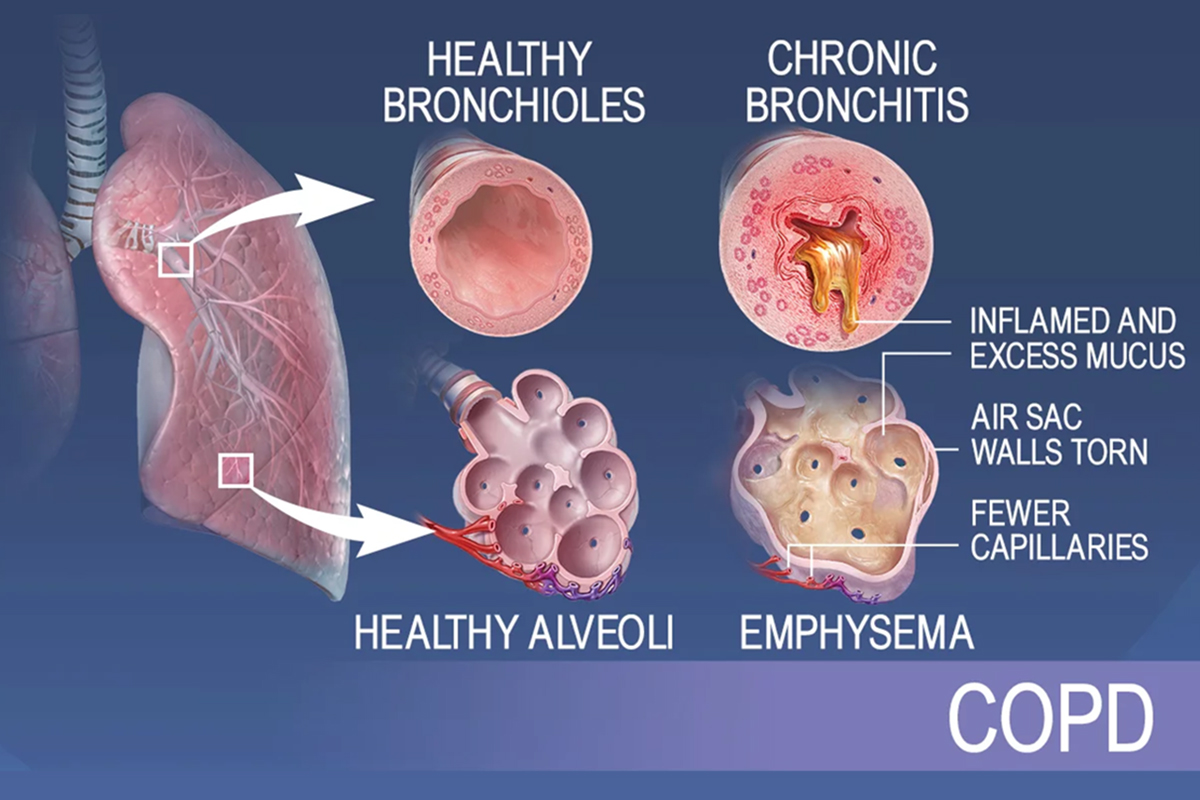6 Common Lung Disorders & Their Causes

Your lungs are vital for keeping your body functioning properly by supplying oxygen and removing carbon dioxide. However, several lung disorders can interfere with this process, affecting your breathing and overall health. Early detection and proper management can make a big difference. Let’s explore five common lung disorders, their causes, and when to consult a specialist.
1. Asthma
Asthma is a chronic inflammatory disease that narrows the airways, making it difficult to breathe. It can cause wheezing, coughing, chest tightness, and shortness of breath.
Causes:
- Exposure to allergens such as dust, pollen, and pet dander
- Air pollution and cigarette smoke
- Genetic factors
Management:
Asthma can be controlled through inhalers, medications, and by avoiding triggers. Regular monitoring by a Pulmonology expert is essential for long-term management.
2. Chronic Obstructive Pulmonary Disease (COPD)
COPD is a progressive condition that includes chronic bronchitis and emphysema, leading to airflow blockage and breathing difficulties.
Causes:
- Long-term smoking or exposure to secondhand smoke
- Air pollutants and occupational dust
- Genetic deficiency (Alpha-1 antitrypsin deficiency)
Management:
Lifestyle changes, inhaled bronchodilators, and oxygen therapy can help manage symptoms and slow progression.
3. Pneumonia
Pneumonia is an infection that inflames the air sacs in the lungs, which may fill with fluid or pus.
Causes:
- Bacterial, viral, or fungal infections
- Weakened immune system
- Hospital-acquired infections
Management:
Treatment depends on the cause of antibiotics for bacterial pneumonia, antiviral drugs for viral types, and antifungal medication if caused by fungi. Vaccinations can help prevent certain types of pneumonia.
4. Lung Cancer
Lung cancer occurs when abnormal cells grow uncontrollably in the lungs. It’s one of the leading causes of cancer-related deaths worldwide.
Causes:
- Smoking and tobacco exposure
- Radon gas or asbestos exposure
- Family history of lung cancer
- Air pollution
Management:
Treatment may include surgery, chemotherapy, radiation therapy, or targeted therapy depending on the cancer stage and type. Early detection through screenings can improve survival rates.
5. Pulmonary Fibrosis
Pulmonary fibrosis causes scarring of lung tissue, making it hard for the lungs to work efficiently.
Causes:
- Long-term exposure to toxins like silica or asbestos
- Certain medications or radiation therapy
- Unknown (idiopathic pulmonary fibrosis)
Management:
Although lung scarring cannot be reversed, medications can help slow its progression. In advanced cases, a lung transplant may be recommended. 6.
6. Tuberculosis (TB)
Tuberculosis is a contagious bacterial infection caused by Mycobacterium tuberculosis, mainly affecting the lungs. It can cause severe respiratory symptoms if not treated promptly.
Causes:
- Airborne transmission from an infected person
- Weakened immune system
- Living or working in crowded or poorly ventilated spaces
Management:
TB is treated with a long-term course of antibiotics (generally 6–9 months). Early diagnosis, adherence to medication, and isolation during active infection are crucial to prevent spread.
Conclusion
Lung health is essential for overall well-being. If you experience persistent cough, breathlessness, or chest pain, consult a Pulmonology specialist for timely diagnosis and treatment. Early care can significantly improve outcomes and quality of life.
Also Read: Exercises to Improve your Lungs
Frequently Asked Questions (FAQs)
What are the early signs of lung disorders?
Early signs may include persistent coughing, wheezing, chest tightness, shortness of breath, or fatigue during physical activity.
Can lung diseases be prevented?
Yes. Avoiding smoking, maintaining good air quality at home, getting vaccinated, and regular health check-ups can help prevent many lung disorders.
When should i see a doctor for breathing problems?
If you experience difficulty breathing, chronic cough lasting more than a few weeks, or chest pain, consult a specialist immediately.
How does smoking affect the lungs?
Smoking damages the airways and lung tissue, leading to diseases like COPD, lung cancer, and chronic bronchitis. Quitting smoking greatly reduces these risks.
Is lung damage reversible?
It depends on the condition. Some disorders, like asthma, can be managed effectively, while others like pulmonary fibrosis cause irreversible scarring. Early treatment helps slow progression.

 Call-an-Ambulance
Call-an-Ambulance



